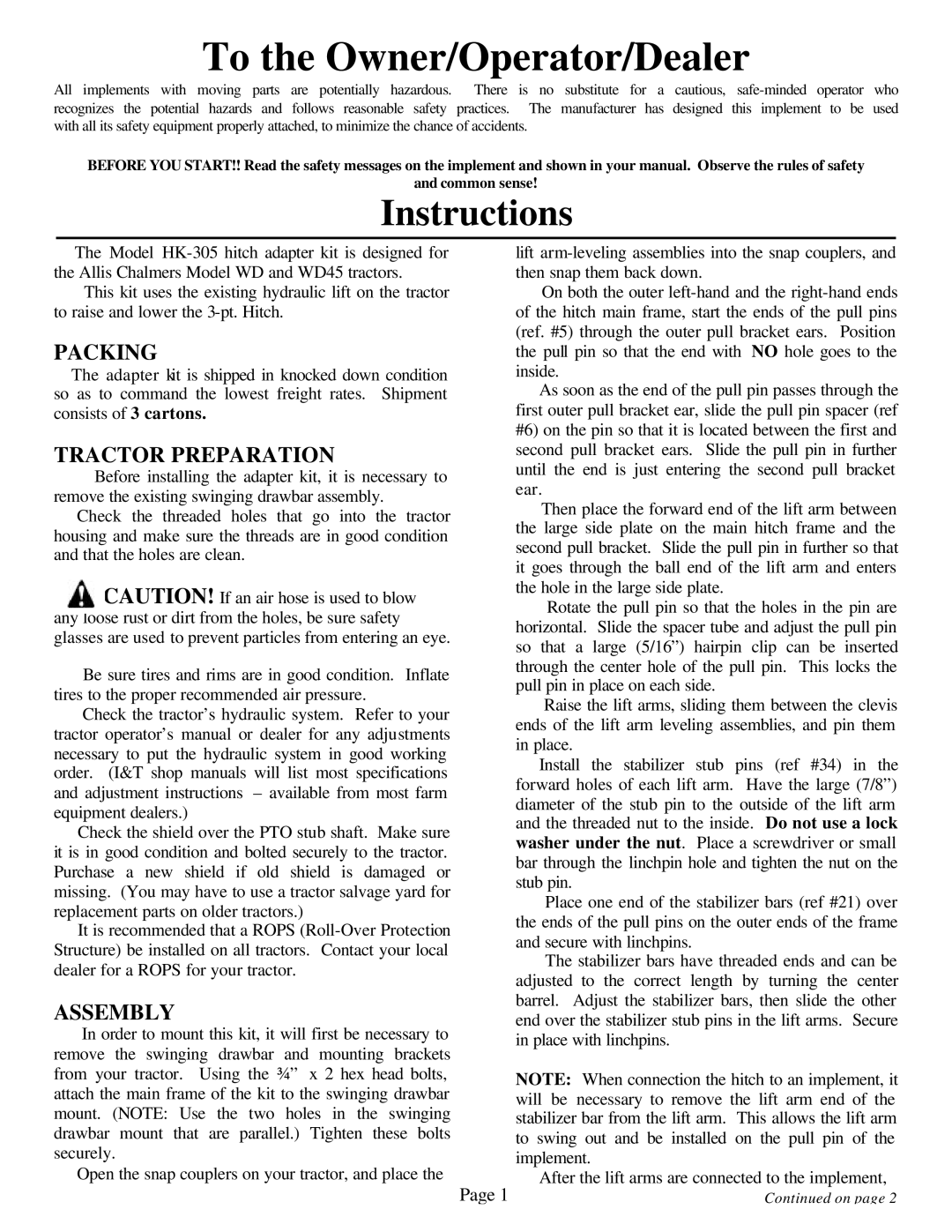To the Owner/Operator/Dealer
All implements with moving parts are potentially hazardous. There is no substitute for a cautious,
BEFORE YOU START!! Read the safety messages on the implement and shown in your manual. Observe the rules of safety
and common sense!
Instructions
The Model
This kit uses the existing hydraulic lift on the tractor to raise and lower the
PACKING
The adapter kit is shipped in knocked down condition so as to command the lowest freight rates. Shipment consists of 3 cartons.
TRACTOR PREPARATION
Before installing the adapter kit, it is necessary to remove the existing swinging drawbar assembly.
Check the threaded holes that go into the tractor housing and make sure the threads are in good condition and that the holes are clean.
![]() CAUTION! If an air hose is used to blow any loose rust or dirt from the holes, be sure safety glasses are used to prevent particles from entering an eye.
CAUTION! If an air hose is used to blow any loose rust or dirt from the holes, be sure safety glasses are used to prevent particles from entering an eye.
Be sure tires and rims are in good condition. Inflate tires to the proper recommended air pressure.
Check the tractor’s hydraulic system. Refer to your tractor operator’s manual or dealer for any adjustments necessary to put the hydraulic system in good working order. (I&T shop manuals will list most specifications and adjustment instructions – available from most farm equipment dealers.)
Check the shield over the PTO stub shaft. Make sure it is in good condition and bolted securely to the tractor. Purchase a new shield if old shield is damaged or missing. (You may have to use a tractor salvage yard for replacement parts on older tractors.)
It is recommended that a ROPS
ASSEMBLY
In order to mount this kit, it will first be necessary to remove the swinging drawbar and mounting brackets from your tractor. Using the ¾” x 2 hex head bolts, attach the main frame of the kit to the swinging drawbar mount. (NOTE: Use the two holes in the swinging drawbar mount that are parallel.) Tighten these bolts securely.
Open the snap couplers on your tractor, and place the
lift
On both the outer
As soon as the end of the pull pin passes through the first outer pull bracket ear, slide the pull pin spacer (ref #6) on the pin so that it is located between the first and second pull bracket ears. Slide the pull pin in further until the end is just entering the second pull bracket ear.
Then place the forward end of the lift arm between the large side plate on the main hitch frame and the second pull bracket. Slide the pull pin in further so that it goes through the ball end of the lift arm and enters the hole in the large side plate.
Rotate the pull pin so that the holes in the pin are horizontal. Slide the spacer tube and adjust the pull pin so that a large (5/16”) hairpin clip can be inserted through the center hole of the pull pin. This locks the pull pin in place on each side.
Raise the lift arms, sliding them between the clevis ends of the lift arm leveling assemblies, and pin them in place.
Install the stabilizer stub pins (ref #34) in the forward holes of each lift arm. Have the large (7/8”) diameter of the stub pin to the outside of the lift arm and the threaded nut to the inside. Do not use a lock washer under the nut. Place a screwdriver or small bar through the linchpin hole and tighten the nut on the stub pin.
Place one end of the stabilizer bars (ref #21) over the ends of the pull pins on the outer ends of the frame and secure with linchpins.
The stabilizer bars have threaded ends and can be adjusted to the correct length by turning the center barrel. Adjust the stabilizer bars, then slide the other end over the stabilizer stub pins in the lift arms. Secure in place with linchpins.
NOTE: When connection the hitch to an implement, it will be necessary to remove the lift arm end of the stabilizer bar from the lift arm. This allows the lift arm to swing out and be installed on the pull pin of the implement.
After the lift arms are connected to the implement,
Page 1 | Continued on page 2 |
